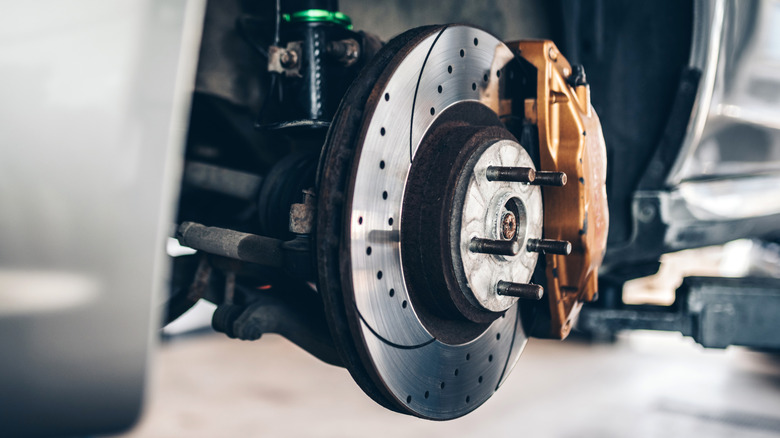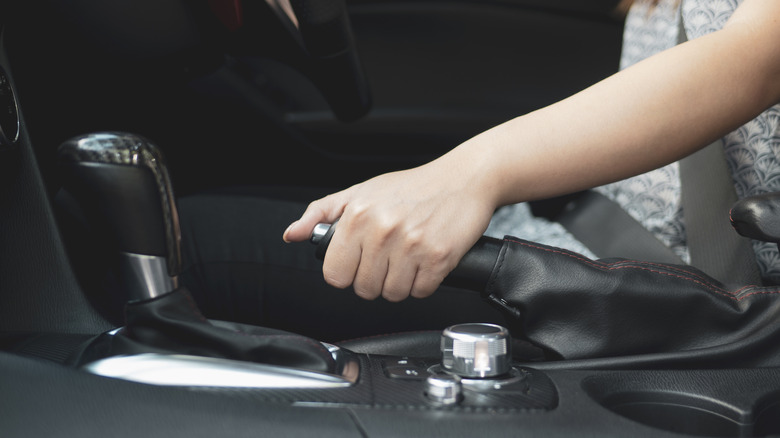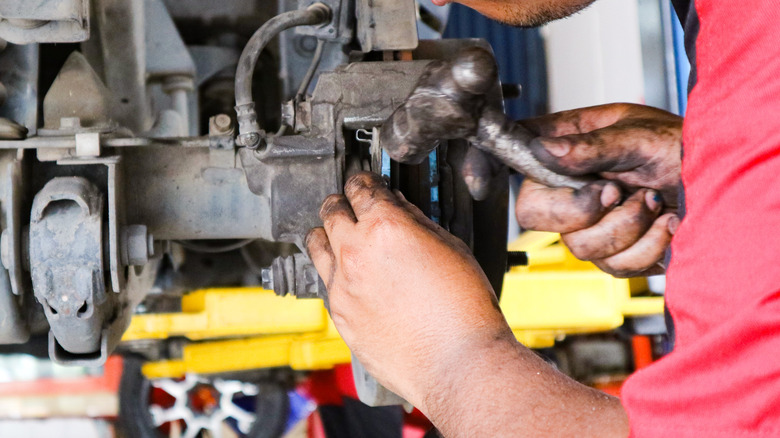Why Do New Car Brakes Smell Like They're Burning?
In the grand scheme of car maintenance, few jobs are more important to be done routinely and correctly than brake replacements. More important than getting a car to run is getting it to stop, so it's crucial to pay attention to the signs that your brake pads need to be replaced, and the indicators that your rotors are on their way out. Fortunately, getting your brakes done can be accomplished quickly and at most major and local mechanics. No matter where you go, though, once the job is done, you might be alerted to a strange, worrying smell coming from your seemingly freshly-repaired brakes.
If you're driving with a fresh set of brakes and notice a burning smell, this isn't cause for alarm. This is all part of the brake replacement process, as this unpleasant scent can be attributed to the resin used in the process. It's an indicator that the material is curing and the brake pads are strengthening to their fullest extent. More often than not, the smell will disappear within a few days, indicating that your brakes are successfully cured and operating as normal. With that said, unfortunately, it's not unheard of for the smell not to go away, meaning you may have to get your brakes looked at.
If the odd smell from your brakes persists after a few days, don't panic. First and foremost, you want to be mindful of how you're treating your brakes and the impacts such behaviors can have on their condition.
Poor driving habits can lead to persistent brake smells
As mentioned, the burning smell coming from your new brakes shouldn't last long. With regular driving, it'll go away in a few days at most, so if it's around much longer, a trip to the mechanic may be in order. Before doing that, though, you should take note of your driving habits. For one, there's the possibility that you left the parking brake engaged. Driving around with the parking brake on is a guaranteed way to generate heat in the brake system, as it will endure extreme friction as you drive. Hopefully, disengaging it will solve the problem. However, if you've been driving with it on for some time, there could be more extensive damage, so it's in your best interest to have it inspected by a professional.
If the culprit isn't a locked-in emergency brake, the issue could be how you use your brakes. The heating up of your brakes to the point of overheating can occur when you get into the habit of braking hard or aggressively, or if your commute involves frequent braking. Other signs that this is the case include a soft, spongy feeling from your brakes when you press down on the brake pedal or a squealing sound when you come to a stop. Although you may have heard that brake pad squeaking only occurs when your brakes are worn down, this is just one of many brake myths that people should stop believing.
Beyond your driving habits, there are other reasons brakes could continue to emit a burning smell. More specifically, mechanical issues you shouldn't ignore.
Mechanical issues could be to blame for smelly brakes
Brake systems are far from simple, so, unfortunately, their many parts will wear down and malfunction over time. As a result of some, you could contend with an enduring burning smell from your brakes, among other issues. One of the more common mechanical problems that can give off this symptom is one or more stuck calipers. These components are responsible for creating friction within the brake system, which pushes the pads against the rotor to slow it and bring the car to a stop. When calipers freeze, they force the pad to make constant contact with the rotor, generating heat and, therefore, a burning smell. In this case, you'll either need the caliper or calipers, unseized if possible, or replaced entirely.
Similarly, if your rear brake system is drum-based, a stuck wheel cylinder could be the source of the problem — another issue best left to a professional. If neither a caliper nor a wheel cylinder is to blame, it's a good idea to have your brake hose inspected. This is a rubber section connected to your steel brake line that moves brake fluid throughout the system. Due to its pliability, it's possible that it could end up pinched, leading to fluid accumulation. Simultaneously, your pads will remain pressed against your rotors, which, as mentioned, will generate heat and give off a burning smell.
There are multiple reasons why your car can stink, with fresh brakes ideally being a temporary additive to the problem. If it overstays its welcome, though, investigation is in order, for the sake of your safety and the health of your vehicle.


